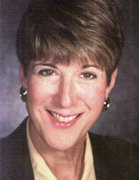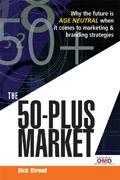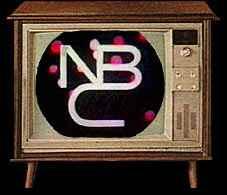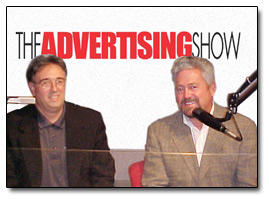
There'll be a blogging break for the holidays.
Let me leave you with a piece by Brent Green:
Baby Boomer New Year's Resolutions
Back after the 1st of the year…

Beginning in 2003, my business blog for Creative Services, Copywriting, Consulting, and Speaking. You'll find all sorts of information about the current trends in advertising and marketing to this unwieldy, diverse demographic.


 Thanks to Second50Years.com for featuring my book:
Thanks to Second50Years.com for featuring my book:Chuck Nyren, an experienced advertiser, provides practical advice geared to help business owners connect more effectively with their Baby Boomer audience.You can also buy the book there.
Second50Years.com finds and packages information about the mature market, making it easier and more affordable for businesses of any size to stay on top of best marketing practices, news, and the demographics of Baby Boomers and Seniors.And make sure to rifle through their Tips Archive. They're offering way too much valuable info for free. (Sort of like this blog and a whole bunch of others...)

 Here's a good piece by Bob Moos of The Dallas Morning News:
Here's a good piece by Bob Moos of The Dallas Morning News:Though marketers still covet the 18-to-49 age group in this youth-obsessed culture, a growing number of companies realize that fiftysomething consumers offer a lucrative business opportunity they can't afford to overlook.I don't agree with everything everybody says in the article (well…I agree with everything I say, of course) — but overall it's on the money.
Marketing experts say companies need to know how to tug at the heartstrings of Americans over 50, because emotional appeals work better with that generation than a recitation of facts.Yes and no. If you do want to 'tug on the heartstrings' you'd better have people creating the campaigns who know which ones to tug at. Tug at really dumb ones, insulting ones, irrelevant ones, and.....
 Columnist Bob Baird of The Journal News made me chuckle more than a few times with his takes on Boomer Nostalgia:
Columnist Bob Baird of The Journal News made me chuckle more than a few times with his takes on Boomer Nostalgia:…I started asking myself, "Wasn't '12 Angry Men' dramatic enough?" Forty years after the 1957 classic with Henry Fonda, Lee J. Cobb, E.G. Marshall, Jack Klugman and all the rest, did we really need a new version with Tony Danza?….. You hear The Who's "Happy Jack" followed by "I Can See for Miles." It sounds like a commercial for "The Who's Greatest Hits," but it's Hummer and a headlight manufacturer hawking their products......if this keeps up, maybe there's a "Who's Greatest Commercial Hits" down the road...
 shower. And I'll give him a couple of bucks to autograph my half-melted and warped "Ticket to Ride" single I have stashed somewhere (even though he didn't sing lead on it). The record wouldn't play anyhow even if I had a turntable and one of those curly, plastic round thingies - so it's not good for much else except to scribble on.
shower. And I'll give him a couple of bucks to autograph my half-melted and warped "Ticket to Ride" single I have stashed somewhere (even though he didn't sing lead on it). The record wouldn't play anyhow even if I had a turntable and one of those curly, plastic round thingies - so it's not good for much else except to scribble on. I had a spirited chat the other day with Margit Novack, founder of Moving Solutions® and President of NASMM, The National Association of Senior Move Managers.
I had a spirited chat the other day with Margit Novack, founder of Moving Solutions® and President of NASMM, The National Association of Senior Move Managers."Moving Solutions helps people relocate. While the context of what we do deals with 'things,' our business is about people and our expertise is about solutions. Our special commitment is working with mature adults, individuals in the midst of health crises and people of any age who have a disability. We also help working professionals accomplish smooth moves in the midst of their over-extended lives. We reduce the stress and physical demands of moving with caring, efficient and cost effective services."
 I advise a leisurely stroll through the two web sites linked above. But if you really want to know more about Moving Solutions (and you do) read this piece in Time Magazine.
I advise a leisurely stroll through the two web sites linked above. But if you really want to know more about Moving Solutions (and you do) read this piece in Time Magazine.
 Douglas Rushkoff has a business book coming out next week:
Douglas Rushkoff has a business book coming out next week:"...the secret of success lies inside the box; businesses that focus on their core competencies, their customers' needs and their work environment come up with better innovations in the long run than those that rely on flashy ad campaigns..."After devouring a two-part interview on Marc Babej's Being Reasonable Blog, it's obvious that Mr. Rushkoff's views on the silliness of most branding techniques mirror my own.
 I think the statute of limitations has expired on this piece I penned for Broadcasting & Cable Magazine. It ran in May 2005 and was available only by subscription:
I think the statute of limitations has expired on this piece I penned for Broadcasting & Cable Magazine. It ran in May 2005 and was available only by subscription:"The idea is simple: a home that is accommodating and convenient to all users at all stages of life. Universal Design principles have been around since the 1970s when the phrase was coined by architect Ronald Mace, who became director of the Center for Universal Design at The University of North Carolina."
 There's nothing much new there for me - but that's probably because I just finished researching and writing an article about UD for The National Association of Homebuilders' 50+Housing Magazine. It's about how to convince Baby Boomers to consider universal design by positioning UD so it doesn't smack of 'old and infirm.'
There's nothing much new there for me - but that's probably because I just finished researching and writing an article about UD for The National Association of Homebuilders' 50+Housing Magazine. It's about how to convince Baby Boomers to consider universal design by positioning UD so it doesn't smack of 'old and infirm.' The press release says, "The University of Maryland continues its series on the Baby Boom Generation." Don't ask me where the rest of the series is or will be.
The press release says, "The University of Maryland continues its series on the Baby Boom Generation." Don't ask me where the rest of the series is or will be."The reality of the marketing opportunity presented by the aging of the Baby Boomers is beginning to be recognizedby the advertising industry, at least. I'm beginning to see more ads targeted at Baby Boomers," says Associate Professor of Business Janet Wagner at Maryland's Robert H. Smith School of Business.Students email me every so often, asking for info about this and that. Colleges and university business schools seem to be paying attention to Baby Boomers. I know this: after Advertising to Baby Boomers was selected by The Advertising Educational Foundation as a classroom resource, schools started to scoop it up. It's now in the libraries of Duke University, The Harvard Business School, Northwestern University, The University of Illinois at Urbana-Champaign, Michigan State University, University of Washington, and lots of others.
 Frederic Serriere has expanded his influential Senior Strategic Network franchise to include a site for the U.S.: The 50 Plus Market News. Bookmark it.
Frederic Serriere has expanded his influential Senior Strategic Network franchise to include a site for the U.S.: The 50 Plus Market News. Bookmark it.
 Even ethereal pundits get tired of their own prattle (at least this one does). I'll take a breather this week, and point you to a variety of other folks (and one big organization) having their say:
Even ethereal pundits get tired of their own prattle (at least this one does). I'll take a breather this week, and point you to a variety of other folks (and one big organization) having their say:
Forrester Research also found that very few online travelers start searches using the new breed of travel search engines — most likely because they are not aware of their existence … Hitwise found that visitors to the top travel search engines were by far likely to be over 55 years of age. Hitwise attributed this to baby boomers …Madison Avenue doesn't think that anybody over forty-five can even turn on a computer. And when some youngster flips it on for them, all they probably do is stare at the virtual desktop until they nod off.
 I stumbled over a review of my book at GenerationTarget.com. Had no idea it was there, have never heard of the company:
I stumbled over a review of my book at GenerationTarget.com. Had no idea it was there, have never heard of the company:GenerationTarget.com is where people can turn for the most sophisticated and current marketing information regarding our multi-generational marketplace. Thanks to the miraculous breakthroughs of extended longevity during the previous century, America now has six living generations. Each generation is like a separate culture with values and drivers exclusive to their own cohort. Just as one radio station could never resonate with all six generations, neither will business be able to capture all six segments using one approach.But I have heard of Dr. Bruce Clark and Mark Goldstein. They co-founded Age Wave in 1986.
 I did a conference call consult recently with a couple of on-the-ball entrepreneurs. The product/service targets Baby Boomers and their interest in continuing education.
I did a conference call consult recently with a couple of on-the-ball entrepreneurs. The product/service targets Baby Boomers and their interest in continuing education.Campus Continuum focuses solely on developing, marketing, and operating university-branded 55+ Active Adult Communities that are tightly integrated with their academic hosts.If you are creating advertising collateral for any sort of adult community, and the housing is near a university or college, turn this into a selling point.
Campus Continuum also works with developers that seek assistance from our experienced team to help them bring their college-affiliated projects to successful fruition. We welcome partnership arrangements.
 The Newsweek cover story this week is about leading-edge Baby Boomers hitting sixty. It's good - although I could've done without the stupid quiz.
The Newsweek cover story this week is about leading-edge Baby Boomers hitting sixty. It's good - although I could've done without the stupid quiz. The Albert Brooks piece had me gagging up my coffee, I was laughing so hard. It's a tongue-in-cheek rant about the ad industry — reminds me of a major theme in my book (hire new and used Baby Boomer creatives because the you-know-whos are screwing it up), along with trenchant comments in Brent Green's book (the dumb use of music):
The Albert Brooks piece had me gagging up my coffee, I was laughing so hard. It's a tongue-in-cheek rant about the ad industry — reminds me of a major theme in my book (hire new and used Baby Boomer creatives because the you-know-whos are screwing it up), along with trenchant comments in Brent Green's book (the dumb use of music):Recently I have been embarrassed to be part of this generation. The reason? Madison Avenue. Madison Avenue is never wrong. They're the neighbor across the street that sees you in the way you don't see yourself. They're young, they're cocky, and what they say about the older generation becomes the truth. People still think there was a real Mr. Whipple, so I know whatever Madison Avenue says about us is what everyone's going to believe anyway.A few days ago I wrote one of my wacky little pieces because an editor for a magazine targeting the aging industry wanted something from me. But he rejected it. Funny thing is, in my article I answered the main question in the cover story, and in Newsweek's Podcast (at least through the prism of marketing/advertising).
 How To Play: The Upcoming Boomer Boom by Tom Van Riper has some juicy quotes from Brent Green and others - along with perceptive (but not surprising) statements such as:
How To Play: The Upcoming Boomer Boom by Tom Van Riper has some juicy quotes from Brent Green and others - along with perceptive (but not surprising) statements such as:Despite conventional wisdom, which keeps many major advertisers focused on younger consumers, the boomer generation is not set in its ways when it comes to product choices, according to studies by MarketResearch.com. In fact, their studies show boomers are more receptive to advertising than their Gen X and Gen Y counterparts, who tend to reject marketing claims out of hand.Old news for a lot of us - but I'm glad the Big Boys are catching on.
 People have asked me why I've kept mum about the Love Those Boomers cover story in Business Week. The answer is this: I'm not telling you why.
People have asked me why I've kept mum about the Love Those Boomers cover story in Business Week. The answer is this: I'm not telling you why. The other day I had a spirited chat with Pete Gammell, Editor/Producer for Seattle's KIRO 710. Then he fashioned my ramblings into something worth listening to (along with adding his own astute comments). The 'special report' aired a bunch of times on Thursday, October 27th.
The other day I had a spirited chat with Pete Gammell, Editor/Producer for Seattle's KIRO 710. Then he fashioned my ramblings into something worth listening to (along with adding his own astute comments). The 'special report' aired a bunch of times on Thursday, October 27th.
 Paramount Market Publishing is also looking into foreign rights. The book is being talked about and lugged around in England, Australia, and Canada.
Paramount Market Publishing is also looking into foreign rights. The book is being talked about and lugged around in England, Australia, and Canada. Dick Stroud's new book The 50-Plus Market is getting rousing reviews. No doubt Kogan Page is thrilled:
Dick Stroud's new book The 50-Plus Market is getting rousing reviews. No doubt Kogan Page is thrilled:"A thoughtful, well-researched and thorough exploration of the 50 plus market. Every marketer should read this book." — John Pickett, Head of Market & Media Research, SagaIt was an honor for me to make a small contribution between the covers.
 Here's a pretty good cover story from American Heritage by Joshua Zeitz.
Here's a pretty good cover story from American Heritage by Joshua Zeitz.
 I'm no Geezer Jock. A bit of golf and hour-long bike rides on a very flat trail three or four times a week is about it for me. I am thinking of taking up tennis again after a ten-year layoff—but doubles only. Or I'd die.
I'm no Geezer Jock. A bit of golf and hour-long bike rides on a very flat trail three or four times a week is about it for me. I am thinking of taking up tennis again after a ten-year layoff—but doubles only. Or I'd die.Our mission is to cover the new and active way of growing old in America. No longer are people settling for shuffleboard. Or mall walking. Or deep knee bends. They are running track, playing baseball - yes, hardball! - and even surfing well into their 60s and beyond. In print and online, GeezerJock celebrates the regenerative power of sports, activity and competition.Certainly GeezerJock is something media planners and buyers should be running after. It's a perfect target market for just about any product or service.
 AARP and Home Depot have put together a few free home-improvement workshops for Baby Boomers. (They're scheduled for October 11th, so I don't know how long the info will be on the page.)
AARP and Home Depot have put together a few free home-improvement workshops for Baby Boomers. (They're scheduled for October 11th, so I don't know how long the info will be on the page.)I guess the CDC and children aren't much different than most advertising agencies. The idea of considering us (except for the obvious age-related products and services) is too 'icky' to think about.Does the CDC think that once it sags it flags? That no one over 44 can rise to the occasion? That sex is not a daily (or weekly) part of our lives? That was what my kids used to think, that my husband and I only had sex twice and it resulted in child one and child two. It was too icky to think of "old" people flapping about shamelessly in the sheets.
 Two major financial planning companies, Fidelity Investments and Ameriprise, are all agog over Baby Boomers.
Two major financial planning companies, Fidelity Investments and Ameriprise, are all agog over Baby Boomers.Tonight I alerted my dad of this upcoming commercial (he was born in '53) and he sighed with exasperation.
 I always like reading pieces about advertising and Baby Boomers by people who are not in the marketing/advertising industry. They don't pontificate (like yours truly) and simply call'em as they see'em.
I always like reading pieces about advertising and Baby Boomers by people who are not in the marketing/advertising industry. They don't pontificate (like yours truly) and simply call'em as they see'em. This week (Sept 28-29) is the Baby Boomer and Senior Marketing Conference in Sydney, Australia:
This week (Sept 28-29) is the Baby Boomer and Senior Marketing Conference in Sydney, Australia:Understanding An Ageing Generation With Youthful Attitudes To Create Intelligent And Non-Patronising Communication StrategiesKevin Lavery and Gill Walker will be presenting.
 Swinging 60s & Baby Boomers Series (Nov 3-4) in London, England:
Swinging 60s & Baby Boomers Series (Nov 3-4) in London, England:A two day, separately bookable extravaganza illustrating the latest trends in the 50+ market.Among the presenters will be Dick Stroud.
The Segmentation Forum will address the debates around the latest innovations in strategic 50+ Segmentation & The Media Consumption Forum will provide the answers to your most pressing concerns regarding the behaviour forming 50+ media habits.
 Simply put, they are ahead of us. Us meaning the U.S., they meaning the U.K., Australia, France, Canada.Here's a piece by Paul McIntyre in The Sydney Morning Herald. Excerpt:
Simply put, they are ahead of us. Us meaning the U.S., they meaning the U.K., Australia, France, Canada.Here's a piece by Paul McIntyre in The Sydney Morning Herald. Excerpt:It's a funny game, advertising. Few want to get serious about targeting those with the money - the older age brackets - which gives the network with the young guns a handy position.They used to follow our leads in marketing, ape our advertising. Now, we'd be in better shape economically if we started following and aping them.
But it will change when the advertising herd does start a meaningful migration to older folks.
 How refreshing to read about a fellow who (in contemporary parlance) gets it.
How refreshing to read about a fellow who (in contemporary parlance) gets it.Using a photograph of a twentysomething Lycra-clad man climbing the rock face of a mountain to sell a Maine vacation is just wrong, Bob Hastings believes.Mr. Hastings also grasps the importance of the internet and how Baby Boomers use it.
-
The "real Maine," Hastings argues, is a place where couples in their 50s might have breakfast in a downtown diner and hear lobstermen gripe about the fishing in the next booth.
 Flack Ace Peter Himler's take on Fidelity Investment's investment in Sir Paul as spokesperson for their company is a must read.
Flack Ace Peter Himler's take on Fidelity Investment's investment in Sir Paul as spokesperson for their company is a must read.Today's seniors are reluctant to buy online from a site they haven't heard of; if they don't know a business offline it won't get their dollars online. But with the age 50-64 group, there's a mentality of wanting to try new things and being adventurous. The fact that an online vendor is newly launched is no deterrent for them.
Have browser, will travel.
 Well, I wish they were my words - but I'm too much of a slobbering gusher. So here's Dick Stroud's simple, concise Theory of Everything (The UK version, at least). He wraps it up pretty well.
Well, I wish they were my words - but I'm too much of a slobbering gusher. So here's Dick Stroud's simple, concise Theory of Everything (The UK version, at least). He wraps it up pretty well. As everyone knows, thanks to so many astute media pundits and marketing/advertising gurus, Baby Boomers think they're still teenagers and are horrified when they look in the mirror and see some hoary stranger in their forties or fifties. (And in a few months, many of these malicious apparitions will take the form of normal human beings in their sixties.)
As everyone knows, thanks to so many astute media pundits and marketing/advertising gurus, Baby Boomers think they're still teenagers and are horrified when they look in the mirror and see some hoary stranger in their forties or fifties. (And in a few months, many of these malicious apparitions will take the form of normal human beings in their sixties.)"The graying of america is at the root of the problem for the $1 billion-plus mass-market hair-coloring business. The category has cooled from double-digit growth the past two decades to more than 4% declines the past two years..."Here's another article by Colette Bancroft of the St. Petersburg Times. An excerpt:
Diana Lewis Jewell is the author of Going Gray, Looking Great! The Modern Woman's Guide to Unfading Glory (Fireside, 2004) and a former marketing director of Vogue.Also check out the adjunct article with quotes from a bunch of old, creaky, silver-haired geezers.
"Look at this generation, our generation," says Jewell, who is in her 50s. "We always wanted to be ourselves."
The number of gray heads is growing, she says, because of "that boomer individualistic attitude: It's okay to be gray."
In her book she cites a poll commissioned by the AARP that shows 53 percent of boomer women and 6 percent of men in that age group color their hair.
"That means 47 percent of women and 94 percent of men don't."

For now, Forth & Towne isn't advertising. It's just throwing open the doors Wednesday and waiting to see who pops in.Oh ...... great idea! Just ignore the largest, richest demographic — a generation very much accustomed to being advertised to (and not particularly happy that they're off the radar nowadays) — and one that has always responded well to intelligent, informative advertising.
Global outplacement firm Challenger, Gray & Christmas reports the nation is on the brink of an explosion of new business start-ups.
The interesting thing is this boom, which is said will resemble the dot. com boom of the late ‘90’s, will be led by baby boomers and would-be retirees and tend to be better educated, healthier, and more tech-savvy than their 20-something predecessors.
 This documentary doesn't have anything to do with advertising to Baby Boomers today — but if you're a Baby Boomer and/or in advertising, it should be fun:
This documentary doesn't have anything to do with advertising to Baby Boomers today — but if you're a Baby Boomer and/or in advertising, it should be fun:Madison Avenue Fever is an entertaining and informative look at the birth and development of television commercials in the 50's and 60's, the period known as the “golden age of television.”More on this "Comic Documentary About the Early Days of TV Advertising."
Remember the Ajax knight on horseback, the happy kid wholearns he has no cavities after brushing with Crest, and so many other commercials that have become a part of American heritage and imbedded in the memories of baby boomers?
 Here's a good article by Karin Lipson of Newsday.com.
Here's a good article by Karin Lipson of Newsday.com.There's never been an "older" audience quite like the baby boomers, for one thing. "I don't necessarily think, as the first baby boomers turn 60, [that they're] necessarily more or less brand-loyal than someone who's 30," Adgate said. "You're getting a group of these 75 million baby boomers who are very, very active, and there's a lot of them."
NBC's Wurtzel, interestingly, agrees. What some advertisers "fail to realize is that there has been a huge change in people's lifestyle," Wurtzel said. Baby boomers, for instance, "wound up having babies 10 years older than the previous generation. If you would really look at a person's 'life stage,' you'd probably have a better predictor of their consuming behavior than if you look at their age. So you can certainly argue that the 19-to-49 demographic is somewhat obsolete."
 While bantering with Ray & Brad on The Advertising Show, we started to talk about the history of advertising—and (no surprise) David Ogilvy's name came up. I think I stumped the stars - asking them how old they thought Mr. Ogilvy was when he wrote his first ad.
While bantering with Ray & Brad on The Advertising Show, we started to talk about the history of advertising—and (no surprise) David Ogilvy's name came up. I think I stumped the stars - asking them how old they thought Mr. Ogilvy was when he wrote his first ad.When he began to make his mark on Madison Avenue, Fortune described him. “At fifty-three, Ogilvy is a remarkable young-looking man, with wavy, dark-blond hair (cut rather long), blue eyes, and a fair complexion, who might easily be mistaken for a successful British actor. He smokes a pipe, his speech is that of an English gentleman, and he wears tweed to the office, where he is served tea every afternoon by a maid named Bridey Murphy. His vests have lapels.”Mr. Roman is the former chairman and chief executive officer of Ogilvy & Mather Worldwide - and was also a guest on The Advertising Show.
 Major thanks to Brad Forsythe, Ray Schilens, Stephanie Ceritelli, and all involved with The Advertising Show for putting up with me as a guest last Sunday, August 7th. It was great fun, and a real honor. (And to be honest, I was a bit shocked that they called. The book is barely out of the gate.)
Major thanks to Brad Forsythe, Ray Schilens, Stephanie Ceritelli, and all involved with The Advertising Show for putting up with me as a guest last Sunday, August 7th. It was great fun, and a real honor. (And to be honest, I was a bit shocked that they called. The book is barely out of the gate.)
With more advertisers looking to enhance their online ads and Web sites with video, more agencies are looking both inside and out to find talent to bridge the gap between offline video and online rich media.Hmmm. I wonder if digital media agencies should take a look at the two chapters in my book that The Advertising Educational Foundation has on their web site.
"The challenge with finding the right people is on a conceptual level," Troy Young, VP of interactive strategy at Omnicom's Organic, told ClickZ News. "This is really hard stuff, creating content that people want to share. The goal is to find storytellers that understand the medium."